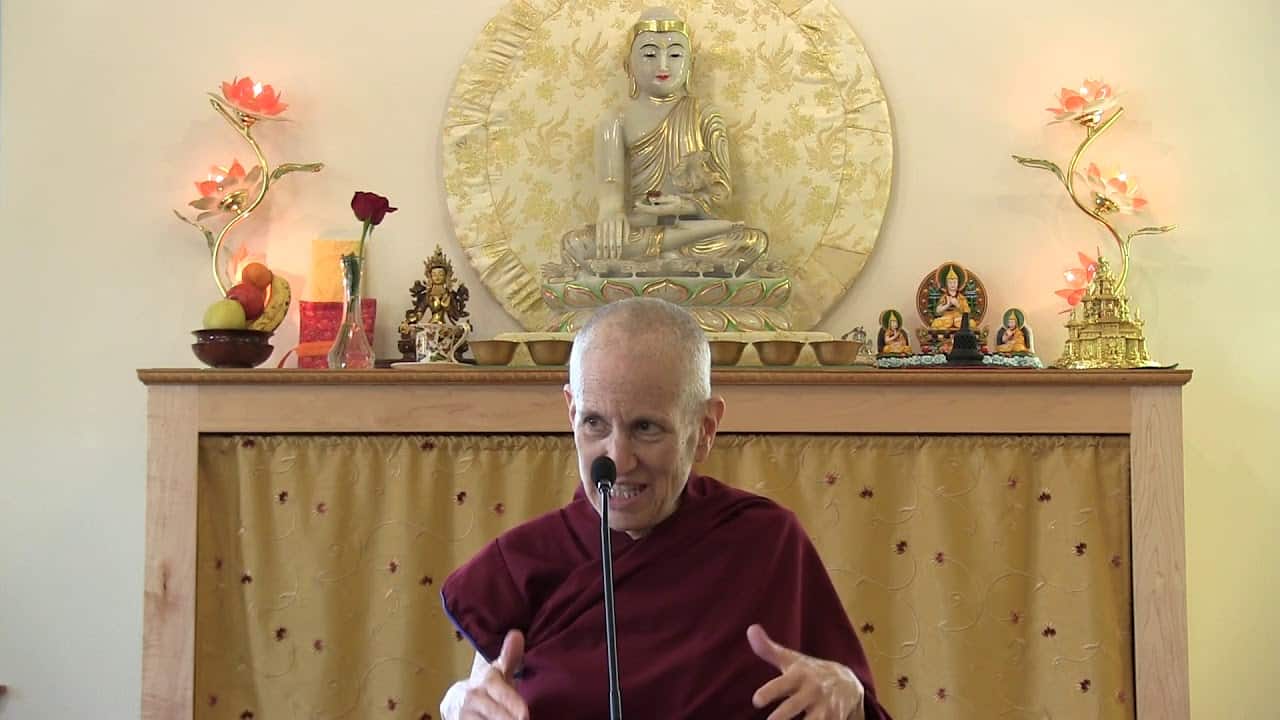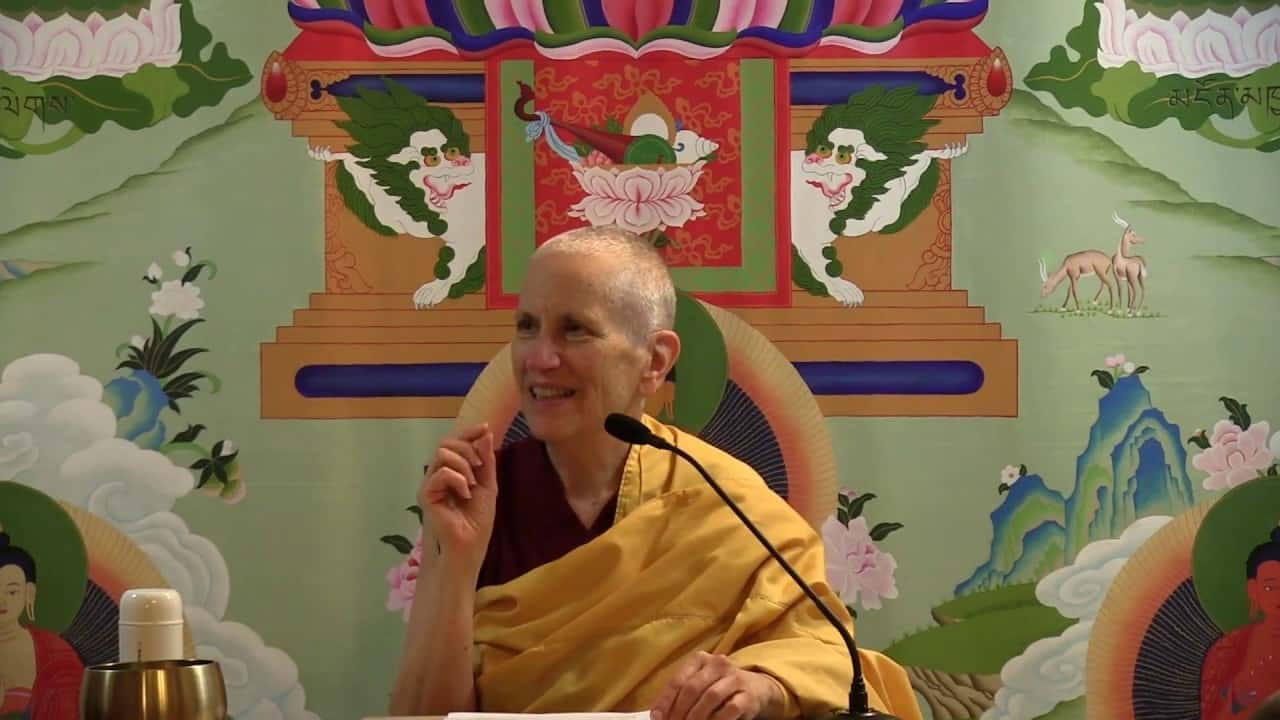Confronting and averting afflictions
Part of a series of short Bodhisattva's Breakfast Corner talks on Langri Tangpa's Eight Verses of Thought Transformation.
- Reminder that other beings cannot send us to the lower realms
- Developing fear of our afflictions, not other people
- Recognizing that when we receive harm, it is due to our karma
Let’s go back to verse three. There’s just a lot in the third verse.
In all actions I will examine my mind
And the moment a disturbing attitude arises
Endangering myself and others
I will firmly confront and avert it.
There’s really a lot in there.
When it says “I will firmly confront and avert it,” what it reminds me of is in Shantideva’s book, when he says that killing external enemies, and making external enemies suffer, is really useless, because they’re going to die anyway. So what’s the use of killing living beings, since they’re born and on the path to death? It’s useless. Retaliation, harming others, doesn’t make any sense. And then he says, besides, those living beings cannot send us to the lower realms. The worst they can ever do is kill us. We’ve died many times before. We need to remember that. Because we tend to be a little bit nervous about death. And there’s good reason to be nervous about death, because we don’t know what our future life is going to be. But to remember also that separating from the body and the ego identity, we’ve done many times before. So it’s not going to be something new in samsara. It’s something old, painful as it is.
Anyway, other living beings, the worst they can do is take our life. They can never send us to the lower realms. They can call us names, they can insult us, they can beat us, they can kill us, they can steal all of our stuff, they can ruin our reputation, they can make fun of us, they can push our buttons, they can do every atrocious thing that is possible, but they cannot send us to the lower realms. What sends us to the lower realms is our own afflictions that get manifested in actions. Those afflictions and that actions—the karma—we do motivated by them are much more sinister, much more fearful, than any other sentient being could possibly be. Sentient beings can threaten us with who knows what, but they can’t make us suffer in the same way that our afflictions and polluted karma make us suffer.
That’s something very important to remember, that the thing to be afraid of is not other living beings. The thing to be most afraid of is our afflictions and the destructive karma that we create that we neglect to purify. Much more sinister than any living being could possibly be.
For that reason, that’s why it says “I will firmly confront and avert it.” Surely, if we had an external enemy, we would do something right away to stop the harm. But this internal enemy is even more harmful than an external enemy could be. So we should never let it abide in our heart. We should never make our afflictions comfortable, offering them a sofa and some chai and some biscuits and “Please sit down, make yourself comfortable. Ruin my life as much as you want.” We should notice these things when they come in and identify them for the demons that they are. There’s no external demon. Mara, the real Mara, is the afflictions that abide within us, that we often don’t even notice, or even we notice, we say, “It’s no big deal, I’ll counteract it tomorrow, right now my feelings are hurt and I want to indulge a little bit.”
I want to indulge in all my negative feelings. Really going to make me happy….
Identifying these, and then firmly confronting and averting them. And meanwhile, for other living beings, if they harm us, they are only the cooperative cause for any harm we receive. The real harm has come from our destructive actions and the seeds of those negative karmas on our mind. Because if we didn’t have those seeds of karma on our mindstream, nobody else could hurt us. Again, instead of being fearful of other living beings, we need to fear the destructive karma on our own mindstream that we haven’t purified. Because as long as we have that, then we’re open to harm. When we purify that karma, then even somebody wants to harm us, they can’t.
You look at the Buddha and his dear cousin Devadatta who was constantly trying to kill him and do harmful things, but was never successful, because the Buddha had purified all that karma that would have made him vulnerable.
So to really emphasize purification in our practice, creation of merit, having kindness and compassion for other living beings. Because like I said, they’re only the cooperative condition if we receive harm. The whole thing is a creation of our unsubdued mind.
And that goes for the situation in the country, too. If we receive harm, it’s due to the karma that we’ve created. No sense being angry or violent or anything towards other living beings. If there are ways to stop their harm, for sure we do that. If there’s injustice, for sure we speak up. But we don’t have to create more enemies by doing that. Because the real enemy is this one, who Shantideva says abides comfortably in our own heart. So let’s be aware of that enemy and ferret it out and counteract it. And in the meantime, be kind to others, because we’re alive due to other beings’ kindness.
Venerable Thubten Chodron
Venerable Chodron emphasizes the practical application of Buddha’s teachings in our daily lives and is especially skilled at explaining them in ways easily understood and practiced by Westerners. She is well known for her warm, humorous, and lucid teachings. She was ordained as a Buddhist nun in 1977 by Kyabje Ling Rinpoche in Dharamsala, India, and in 1986 she received bhikshuni (full) ordination in Taiwan. Read her full bio.


